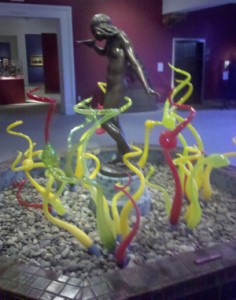 A representative from BBC One confirmed that a series of questions dealing with John Updike’s works will come up on a broadcast of Mastermind later this year. That’s all we can say, because, hey, we don’t want to give anything away and spoil the show. But several members of the Society board were contacted by someone from BBC’s Pronunciation Unit. The BBC is certainly thorough.
A representative from BBC One confirmed that a series of questions dealing with John Updike’s works will come up on a broadcast of Mastermind later this year. That’s all we can say, because, hey, we don’t want to give anything away and spoil the show. But several members of the Society board were contacted by someone from BBC’s Pronunciation Unit. The BBC is certainly thorough.
Author Archives: James Plath
Drinking Girl on display again in Reading
“While in Berks county, Liz, I and kids got to the Reading Museum and we were happy to see that the Drinking Girl fountain is back in her place on the third floor landing. They have our father’s description from The Centaur on display.
However, there is a slight twist to this situation in that from the water of the fountain emerges several Dale Chihuly red, green and yellow glass “reeds.” The girl is surrounded by them. It was a site-specific work that the museum commissioned, but I’m not convinced it is a successful marriage of contemporary glass and nineteenth century figurative work . . . although from the back the reeds rhythmically mimic her S-shaped posture.”
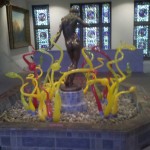 According to the Reading Public Museum, which hasn’t displayed Drinking Girl (by sculptor Edward McCartan) for three years prior to its current exhibition in conjunction with “Tiffany Lamps: Articles of Utility, Objects of Art,” the fountain that made a lasting impression on a young John Updike will remain on display for at least another six months. Museum hours are 11 a.m. to 5 p.m. Tuesday through Saturday, and noon to 5 p.m. on Sundays. They are closed on Mondays. Admission is $8.00.
According to the Reading Public Museum, which hasn’t displayed Drinking Girl (by sculptor Edward McCartan) for three years prior to its current exhibition in conjunction with “Tiffany Lamps: Articles of Utility, Objects of Art,” the fountain that made a lasting impression on a young John Updike will remain on display for at least another six months. Museum hours are 11 a.m. to 5 p.m. Tuesday through Saturday, and noon to 5 p.m. on Sundays. They are closed on Mondays. Admission is $8.00.
Updike children honor their father at Plowville cemetery
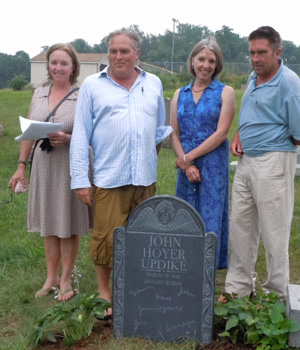 Bruce Posten wrote a story for the Reading Eagle. This report was written by Society board member Jack De Bellis:
Bruce Posten wrote a story for the Reading Eagle. This report was written by Society board member Jack De Bellis:
In Plowville Cemetery, where generations of John Updike’s relatives rest, John Updike’s children, Liz, David, Michael and Miranda gathered to show publicly their love for their father. The ceremony took the form of the placing of a headstone carved by Michael with affection and wit on Pennsylvania slate. The stone featured John Updike’s signature in its many representations, including “Johnny” as he was known by his parents. Linda and Wesley Updike rested only inches from the headstone. Atop the monument Michael had carved an angel in the New England style, a face with wings. He cleverly carved his father’s smiling face showing that though he feared death all his life, he had a faith which would enable him to ascend, happily, to heaven. On the reverse of the stone Michael had cut both stanzas from Updike’s poem “Telephone Poles”. There was little doubt he still communicated with those assembled.
The gathering included the spouses of Miranda and David, many of their children, and one, Trevor, who bears his grandfather’s features to a remarkable degree. John Updike’s blood flowed in many veins. Also honoring John were his former classmates and lifelong friends Jackie Hirneisen Kendall and Joan Venne Youngerman; David Silcox, who had kept Updike abreast of Shillington news; Jack De Bellis, Alvernia University’s John Updike Scholar in Residence; and Patricia De Bellis. Continue reading
The books Updike was reading before he died
Andromeda Romano-Lax posted a blog entry on a website called 49 Writers that lists the books John Updike was reading at the time of his death in 2009—apparently in preparation for an unfinished novel he was writing.
Here’s the link.
A report on the Updike biography-in-progress
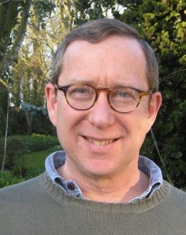 Adam Begley, who is under contract to produce an as-yet-untitled biography of John Updike for HarperCollins, writes that the work is going well and that there’s enthusiastic support for the project. In addition to a 2010 Guggenheim Fellowship that got him started, he has received a 2011-12 fellowship from The Leon Levy Center for Biography, based on a section from the third chapter that he submitted. The chapter details the 18 months that Updike spent in New York City.
Adam Begley, who is under contract to produce an as-yet-untitled biography of John Updike for HarperCollins, writes that the work is going well and that there’s enthusiastic support for the project. In addition to a 2010 Guggenheim Fellowship that got him started, he has received a 2011-12 fellowship from The Leon Levy Center for Biography, based on a section from the third chapter that he submitted. The chapter details the 18 months that Updike spent in New York City.
Research is progressing nicely, Begley says, adding that he still was work to do in Pennsylvania and that he’s in the middle of a long fourth chapter about Ipswich. “I spend most of every day with John Updike,” Begley writes, “and after more than two years I can report that I haven’t been bored for a minute.”
Begley says he’s hoping to have a first draft completed by the end of June 2012 so he will be free when new Updike materials at the Houghton Library become available to researchers in July 2012. Publication of the biography is set for sometime in 2013.
Panels a success—a brief report from ALA 2011
The whole Society will gather in Boston in June 2012, but this year at ALA the two panels sponsored by the Society were full of great papers that provoked interesting discussions. Here are the minutes-5-28-2011-1 from the business meeting. They won’t be approved until the next meeting. Thanks to Judie Newman, Peter Bailey, Ed Allen, Brian Steffen, Richard Androne, Kangqin Li, John McTavish, and Quentin MIller for participating.
Celeb uses Updike’s Marry Me to propose
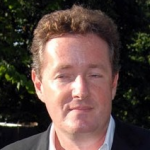 He’s not the first to do so, but British journalist and America’s Got Talent judge Piers Morgan pulled out a copy of John Updike’s Marry Me when it came time to pop the question. His now-fiancé is apparently quite the Updike fan. Here’s the STV article. Thanks to Jack De Bellis for drawing it to our attention.
He’s not the first to do so, but British journalist and America’s Got Talent judge Piers Morgan pulled out a copy of John Updike’s Marry Me when it came time to pop the question. His now-fiancé is apparently quite the Updike fan. Here’s the STV article. Thanks to Jack De Bellis for drawing it to our attention.
Conference dates, call for papers announced
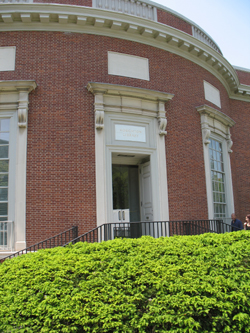 It’s official: the dates for the Second Biennial John Updike Society Conference at Suffolk University in Boston are June 13-16, 2012. Plan on getting to Boston the night of the 12th if you don’t want to miss anything. As with the first conference, there will be a combination of academic sessions and panels/talks from people who knew John Updike well. While field trips are still being arranged, the Houghton Library (pictured) will mount a special exhibit and host a reception for attendees, and we’ll spend an afternoon at Harvard seeing some of the Updike sites there. We’ll also take a trip to the North Shore to see Updike sites, with another trip to Salem that will tie in with panels on Updike and Hawthorne. We may also take a side trip to Fenway Park.
It’s official: the dates for the Second Biennial John Updike Society Conference at Suffolk University in Boston are June 13-16, 2012. Plan on getting to Boston the night of the 12th if you don’t want to miss anything. As with the first conference, there will be a combination of academic sessions and panels/talks from people who knew John Updike well. While field trips are still being arranged, the Houghton Library (pictured) will mount a special exhibit and host a reception for attendees, and we’ll spend an afternoon at Harvard seeing some of the Updike sites there. We’ll also take a trip to the North Shore to see Updike sites, with another trip to Salem that will tie in with panels on Updike and Hawthorne. We may also take a side trip to Fenway Park.
So mark your calendars and start thinking of what new research and insights you might share with members. Here’s the Call for Papers
First issue of JUR arrives in September; Emerging Writers Prize announced
 The first issue of The John Updike Review will arrive in September, with a hard copy mailed to all paid-in-full members (dues statements are on their way). In addition, editor James Schiff announced the sponsorship of The John Updike Review Emerging Writers Prize, which consists of $1000 and publication in the Review.
The first issue of The John Updike Review will arrive in September, with a hard copy mailed to all paid-in-full members (dues statements are on their way). In addition, editor James Schiff announced the sponsorship of The John Updike Review Emerging Writers Prize, which consists of $1000 and publication in the Review.
Anyone 40 years of age or younger is invited to enter. Submissions are open and rolling. Depending upon the quality of submissions, one or more winners will be announced annually.
The John Updike Review is looking for an essay by a young writer or critic that deepens our understanding of the work of John Updike. The writing may be scholarly or belletristic in nature. Academics, critics, graduate students, assistant professors, novelists, poets, and short story writers are encouraged to submit essays, which should be 10 to 30 pages long.
Send submissions via attachment to: Prof. James Schiff, Editor, The John Updike Review, james.schiff@uc.edu. For more information about the journal, visit the website.
Amazon is now taking preorders for Higher Gossip
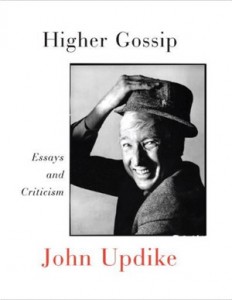 Amazon.com has begun accepting preorders for Higher Gossip: Essays and Criticism, edited by Christopher Carduff. Here’s the link.
Amazon.com has begun accepting preorders for Higher Gossip: Essays and Criticism, edited by Christopher Carduff. Here’s the link.
As we reported earlier, Higher Gossip is divided into five sections:
“Real Conversation” consists of two previously published personal essays, one previously published humorous piece, three previously published short fictions, and six poems (”The Lovelorn Astronomer,” “Basium XVI,” “Head of a Girl, at the Met,” “Cafeteria, Mass. General Hospital,” “An Hour Without Color,” and “Not Cancelled Yet.”
“Book Chat” includes three speeches (”Humor in Fiction,” “The Plight of the American Writer,” and “The Written Word”); tributes to Kierkegaard, Fitzgerald, Hemingway, Sissman, and Carver; three forewords/afterwords; and 15 book reviews.
“Gallery Tours” features 20 essays on art, and “Pet Topics” contains three previously published essays on science, six musings on Massachusetts (including “Harvard Square in the Fifties,” “Ipswich in the Seventies,” and “Memoirs of a Massachusetts Golfer”), and five post-Golf Dreams writings on golf.
“Table Talk” is the ephemeral category, including remarks made at book conventions, short musing, forewords, addresses, letters, prefaces, notes, and a humorous piece on “The original ending of Self-Consciousness.“

